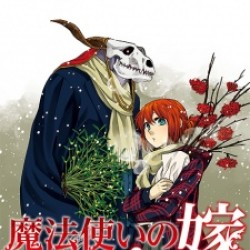

She gives up hope, leaving the book Riichi gave her–the picture book–behind as her relatives send her away for the last time. Yet upon completing Riichi’s request to return a book to the woman he was in love with, Chise no longer has any reason to go on. With his dying breath, he gives Chise a reason to move past the current tragedy in front of her, rather than remaining by his side and getting devoured by the monster as well. The monster that had been lingering near Chise, the one that didn’t let her rest in her relatives’ home, manages to sneak into the library, destroying all the books within it and killing Riichi in the process. Riichi’s kindness also shows us the unfortunate repercussions of a relapse when Chise’s new haven is taken away from her. Riichi gives her all the support and kindness Chise lacked from her relatives and society as a whole, making sure she knows she can return to the library at any time and read any of the books she wants.

Chise’s nervousness and bleak outlook on the world only begin to ebb when she stumbles upon a library hidden in the woods which is run by a kindly mage named Riichi. Chise isn’t entirely neglected, but the OVA points out both how difficult it can be to live with an invisible illness (seeing creepy magical creatures that are invisible to other people may not be an allegory for mental illnesses, but it sure seems like it) and that some people are more content to sit and wonder what’s wrong rather than actually trying to help. From there, her relatives take her in, but become frustrated and cruel when Chise doesn’t “warm up” to them they’re unwilling to be sympathetic to her trauma and are ignorant of the fear that she lives in each day from seeing creepy monsters all over the place. Chise’s memories start with her mother committing suicide, complete with the “I never should have given birth to you” line. While the OVA doesn’t get into the slavery-specific parts of Chise’s childhood, it does show or mention in passing the parts that built up to her believing that a life of slavery would be preferable to living her own life. More importantly, Those Awaiting A Star subtly shows off the environment Chise comes to thrive in as well as her relationship to Elias (the magus) in a way that quells the worries I, as someone who hasn’t read the manga, had about that too! It’s impossible to avoid that completely, as the episodes focus on Chise’s childhood, but if you share my concerns, I’m here to tell you that the OVAs didn’t turn into the Chise torture hour. It was advertised as a prequel story, so I was a bit hesitant that the OVA would be focusing mostly on the situation that brought heroine Chise to her living arrangements with her fiance, the titular ancient magus doing so would almost certainly mean focusing on the neglect and abuse Chise suffered, and three episodes of that sounds kind of like the worst thing ever. Despite being unaware that an OVA was even happening, I eagerly dove into the three 25 minute episodes. Of course, that means witches and magic!īack in March of last year I talked about how excited I was for the upcoming anime adaptation of the manga The Ancient Magus’ Bride, and just recently the three part OVA, Those Awaiting A Star, finished airing in Japan. In an effort to prove that temperature doesn’t rule my life–even when I’m dying and making offerings for those crisp fall days to come the fuck on already–I’ve started to dive into that good seasonal content.



 0 kommentar(er)
0 kommentar(er)
